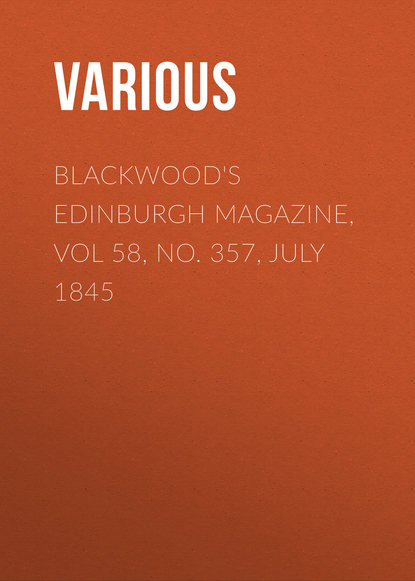По всем вопросам обращайтесь на: info@litportal.ru
(©) 2003-2024.
✖
Blackwood's Edinburgh Magazine, Vol 58, No. 357, July 1845
Автор
Год написания книги
2017
Настройки чтения
Размер шрифта
Высота строк
Поля
Antonio Montecatino, Secretary of State.
In Tasso we have portrayed to us the poetic temperament, with some overcharge in the tendency to distrust and suspicion, which belongs, as we learn from his biography, to the character of Tasso, and which again was but the symptom and precursor of that insanity to which he fell a prey. Both to relieve and develope this poetic character, we have its opposite (the representative of the practical understanding) in Antonio Montecatino, the secretary of state, the accomplished man of the world, the successful diplomatist. It may be well to mention that the speeches in the play given to Leonora d'Este, with whom Tasso is in love, are headed The Princess; and it is her friend Leonora Sanvitale, Countess of Scandiano, who speaks under the name of Leonora.
"Act. I. – Scene I
A garden in the country palace of Belriguardo, adorned with busts of the epic poets.
To the right, that of Virgil – to the left, that of Ariosto.
Princess, Leonora
"Princess.– My Leonora, first you look at me
And smile, then at yourself, and smile again.
What is it? Let your friend partake. You seem
Very considerate, and much amused.
"Leonora.– My Princess, I but smiled to see ourselves
Decked in these pastoral habiliments.
We look right happy shepherdesses both,
And what we do is still pure innocence.
We weave these wreaths. Mine, gay with many flowers,
Still swells and blushes underneath my hand;
Thou, moved with higher thought and greater heart,
Hast only wove the slender laurel bough.
"Princess.– The bough which I, while wreathing thoughts, have
wreathed,
Soon finds a worthy resting-place. I lay it
Upon my Virgil's forehead.
[Crowns the bust of Virgil.
"Leonora. And I mine,
My jocund garland, on the noble brow
Of Master Ludovico.
[Crowns the bust of Ariosto.
Well may he,
Whose sportive verse shall never fade, demand
His tribute of the spring!
"Princess. 'Twas amiable
In the duke, my brother, to conduct us,
So early in the year, to this retreat.
Here we possess ourselves, here we may dream
Uninterrupted hours – dream ourselves back
Into the golden age which poets sing.
I love this Belriguardo; I have here
Pass'd many youthful, many happy days;
And the fresh green, and this bright sun, recall
The feelings of those times.
"Leonora. Yes, a new world
Surrounds us here. How it delights – the shade
Of leaves for ever green! how it revives —
The rushing of that brook! with giddy joy
The young boughs swing them in the morning air;
And from their beds the little friendly flowers
Look with the eye of childhood up to us.
The trustful gardener gives to the broad day
His winter store of oranges and citrons;
One wide blue sky rests over all; the snow
On the horizon, from the distant hills,
In light dissolving vapour steals away."
The conversation winds gracefully towards poetry and Tasso. We will answer at once the interesting question, whether the poet has represented Leonora d'Este, the princess, as being in love with Tasso. He has; and very delicately has he made her express this sentiment. From the moment when, doubtless thinking of the living poet, she twined the laurel wreath which she afterwards deposited on the brow of Virgil, to the last scene where she leads the unhappy Tasso to a fatal declaration of his passion, there is a gentle crescendo of what always remains, however, a very subdued and meditative affection. She loves – but like a princess; she muses over the danger to herself from suffering such a sentiment towards one in so different a rank of life to grow upon her; she never thinks of the danger to him, to the hapless Tasso, by her betrayal of an affection which she is yet resolved to keep within subjection. To be sure it may be said, that all women have something of the princess in them at this epoch of their lives. There is a wonderful selfishness in the heart, while it still asks itself whether it shall love or not. The sentiment of the princess is very elegantly disguised in the jesting vein in which she rallies Leonora Sanvitale —
"Leonora.– Your mind embraces wider regions; mine
Lingers content within the little isle,
And 'midst the laurel grove of poesy.
"Princess.– In which fair isle, in which sweet grove, they say,
The myrtle also flourishes. And though
There wander many muses there, we choose
Our friend and playmate not alone from them,
We rather greet the poet there himself,
Who seems indeed to shun us, seems to fly,
Seeking we know not what, and he himself
Perhaps as little knows. 'Tis pretty when,
In some propitious hour, the enraptured youth
Looking with better eyes, detects in us
The treasure he had been so far to seek.
"Leonora.– The jest is pleasant – touches, but not near.
I honour each man's merit; and to Tasso
Am barely just. His eye, that covets nothing,
Light ranges over all; his ear is fill'd
With the rich harmony great nature makes;
What ancient records, what the living scene,
Disclose, his open bosom takes it all;
What beams of truth stray scattered o'er this world,
His mind collects, converges. How his heart
Has animated the inanimate!
How oft ennobled what we little prize,
And shown how poor the treasures of the great!
In this enchanted circle of his own
Proceeds the wondrous man; and us he draws
Within, to follow and participate.
He seems to near us, yet he stays remote —











